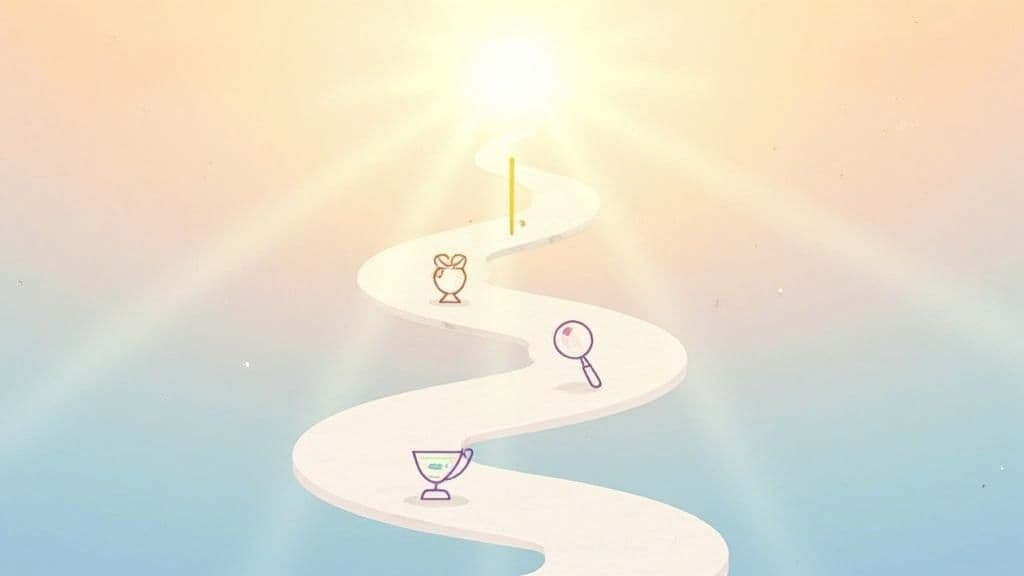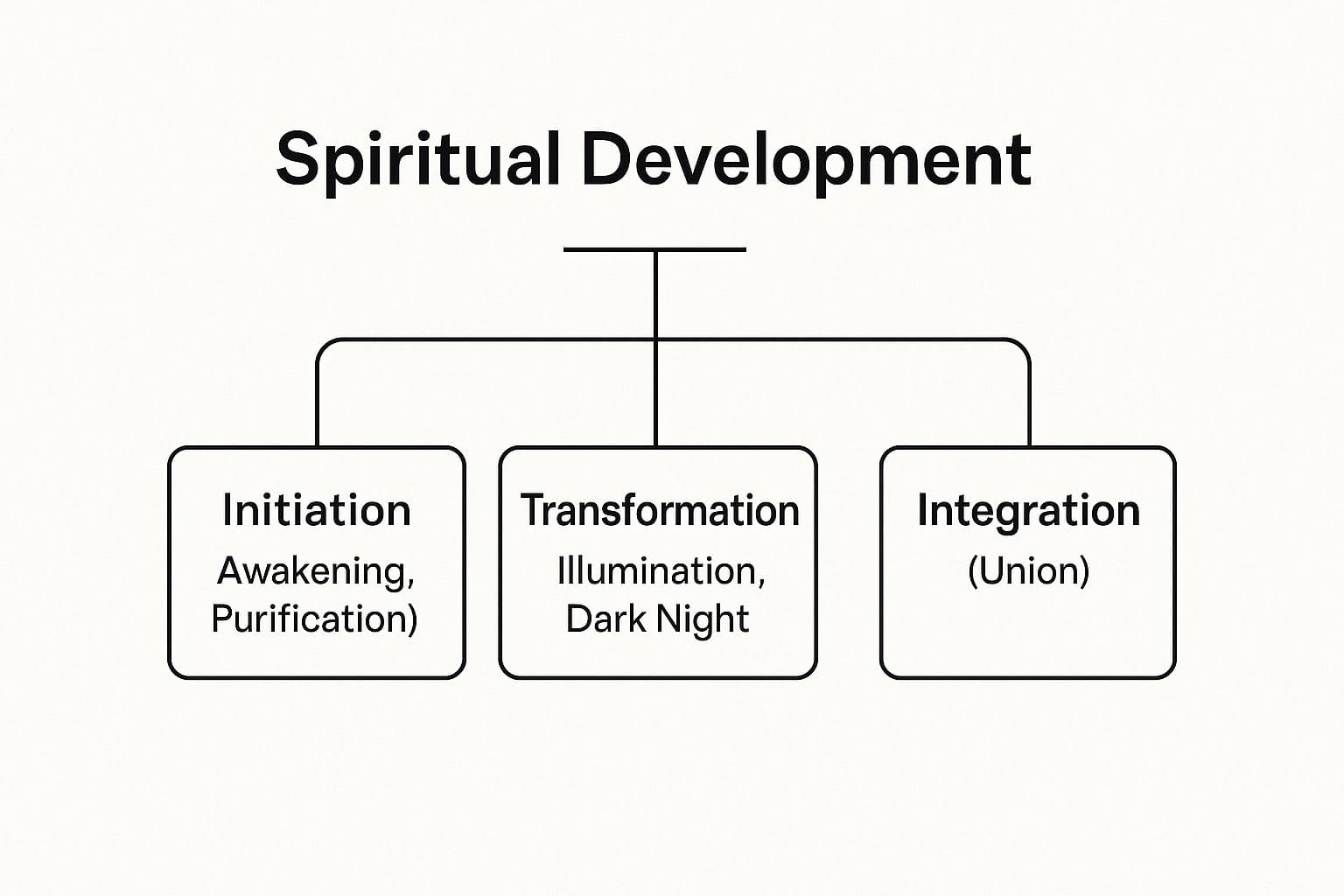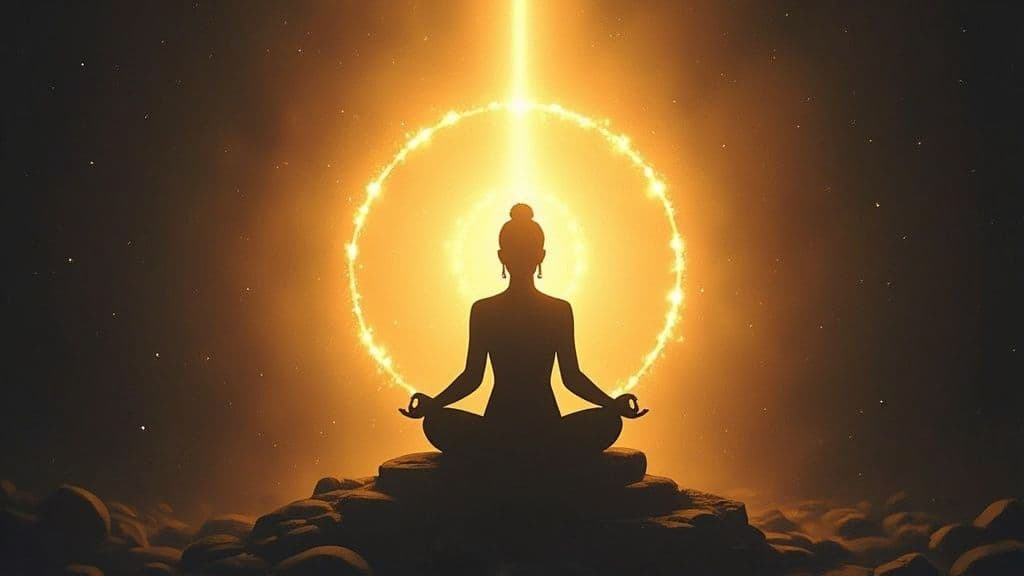Starting a spiritual path can feel like receiving a map to an unfamiliar interior landscape. This practical guide clarifies common stages of spiritual development, sets realistic expectations, and offers tools to navigate doubt while building an authentic, grounded practice. Whether you’re just beginning or deep into the process, these insights help you move with clarity and compassion.
July 5, 2025 (8mo ago) — last updated January 6, 2026 (1mo ago)
Spiritual Development Stages: Practical Guide
Practical guide to stages of spiritual growth, common challenges, and evidence-based practices to integrate spirituality into daily life.
← Back to blog
Stages of Spiritual Development: Practical Guide
Summary: Explore stages of spiritual development—from awakening to universal connection—with practical tools, common challenges, and ways to integrate growth into daily life.
Introduction
Starting a spiritual path can feel like receiving a map to an unfamiliar interior landscape. This practical guide clarifies common stages of spiritual development, sets realistic expectations, and offers tools to navigate doubt while building an authentic, grounded practice. Whether you’re just beginning or deep into the process, these insights help you move with clarity and compassion.
Your Guide to Navigating Spiritual Growth
The path of spiritual growth isn’t a straight line. It’s a personal, often looping evolution of consciousness. Many people shift from beliefs inherited from family or culture toward truths discovered within, and eventually toward a felt sense of universal connection. A clear framework brings validation and direction when you feel lost.
This guide provides a practical compass to help you recognize where you are and what may be ahead.
Core Phases of Spiritual Growth
The journey often moves through three broad phases: Initiation, Transformation, and Integration. Each phase supports deeper wholeness.

- Initiation: The first stirrings of awakening.
- Transformation: Deep inner work and reconstruction of beliefs.
- Integration: Spiritual practice becomes part of daily life.
Foundational Models of Development
The idea of stages of spiritual development has a long history in psychology and religion. One influential framework was proposed by James W. Fowler in 1981, mapping how belief and meaning-making evolve across the lifespan1.
Grounding practices help at every stage. Creative mindfulness exercises, journaling, and simple body-centered practices build clarity and resilience. For guided tools that offer structure, see the Life Purpose App and related resources on how to grow spiritually (Life Purpose App).
Key insight: Understanding stages isn’t about labeling yourself or racing to a finish line. It’s about cultivating patience and compassion. Self-awareness is your most reliable compass.
Overview of Key Spiritual Development Stages
| Stage Name | Core Characteristic | Primary Challenge |
|---|---|---|
| The Awakening | A sudden or gradual disillusionment with ordinary life; a deep yearning for something more. | Feeling lost, confused, or isolated as old identities and beliefs fall away. |
| The Questioning | Examining inherited beliefs and seeking personal truth. | Facing a “dark night of the soul” as comfortable worldviews are deconstructed. |
| The Rebuilding | Creating a personal spiritual framework based on experience and inner authority. | Taking ownership of a unique path, even if it means standing apart from community. |
| The Integration | Embracing paradox, complexity, and a felt sense of oneness. | Living universal compassion and service in everyday life. |
This high-level view prepares you for a deeper look at each phase.
Moving from Certainty to Questioning

Many begin with a sense of certainty: a cultural or familial map that provides safety and belonging. Real personal growth often leads into the Questioning stage, where you start asking, “Is this my map?”
The Courageous Act of Deconstruction
Questioning is a brave act. It can be triggered by a life event, a nagging sense that something’s wrong, or curiosity about other perspectives. The world becomes less black-and-white; this can feel disorienting but is a healthy part of maturity. Research finds persistent patterns of early-stage faith in many communities, which helps explain why deconstruction can feel so disorienting when peers remain comfortable with inherited beliefs2.
Navigating the Dark Night
Deconstruction is often called the “dark night of the soul.” Old comforts crumble and you may feel alone. Treat this as the clearing necessary before rebuilding something authentic. Practical tools that offer self-knowledge can be a lifeline.
Understanding your personal patterns can turn confusion into focused exploration.
Key internal shifts in this stage include:
- From external authority to inner guidance.
- From belief to direct experience.
- From rules to authentic values.
This stage lays the foundation for building a resilient, personal spirituality.
Building Your Personal Spiritual Framework
Once the questioning settles, construction begins. You move from inherited systems to designing your own spiritual home. Authority shifts inward: lived experience, intuition, and reflection become primary.
Taking Ownership of Your Values
Rebuilding is deeply personal. Choosing values that genuinely resonate takes courage and reflection. Research indicates spirituality contributes strongly to meaning-making and a sense of purpose, especially in youth development contexts3.
This independence can feel liberating and isolating at once. Solitude and honest reflection help your inner voice become clear.
Practical Strategies for the Rebuilding Phase
- Integrate self-knowledge: Use tools that illuminate your core patterns. Life Purpose App offers personalized insights tied to life themes.
- Journal for clarity: Track thoughts, questions, and daily experiences to see patterns emerge.
- Seek supportive communities: Find people who respect individual exploration rather than demand conformity.
These practices help you test beliefs in daily life and build a spirituality that fits who you are.
Embracing Paradox and Universal Connection

After building a personal framework, many enter a phase of expanded worldview—often called the Conjunctive stage—where paradox is embraced and multiple truths can coexist.
The Power of Holding Paradox
You begin to hold two opposing ideas without needing one to be right and the other wrong. Scientific and mystical viewpoints can coexist and complement each other. Many people find a spiritual gifts assessment helpful to identify emerging intuitive strengths.
Key takeaway: Truth becomes seen as an interconnected web rather than a single point.
Living as Universal Connection
Following the Conjunctive stage, some reach a Universalizing stage—an embodied sense of oneness with life. This often shows up as radical compassion, sustained selfless service, and a diminished ego sense. Historical figures like Mother Teresa or Mahatma Gandhi exemplify this integrated life of service.
Characteristics include:
- Radical compassion for all beings.
- Service as lived practice rather than achievement.
- Dissolution of an isolated ego identity.
This stage represents spiritual maturity as lived action.
Navigating the Bumps on the Spiritual Road
The spiritual journey includes common traps. Two persistent pitfalls are spiritual bypassing and the spiritual ego. Spiritual bypassing uses spiritual ideas to avoid difficult feelings, while the spiritual ego turns progress into identity and separation.
How to Stay Grounded
Practical ways to remain integrated:
- Practice embodiment: Return awareness to your body and breath to stay present. See our guide to mindfulness practices. Research shows brief mindfulness and meditation programs can reduce stress and improve well-being4.
- Journal with radical honesty: Record doubts and difficult emotions as well as breakthroughs.
- Find real community: A healthy group welcomes questions and resists placing anyone on a pedestal.
True spiritual growth doesn’t erase problems; it gives you the resilience to meet them.
Challenges and Supportive Practices by Stage
| Stage | Common Challenge | Supportive Practice |
|---|---|---|
| Stage 1: The Call | Feeling overwhelmed or skeptical. | Grounding meditations to anchor the senses. |
| Stage 2: The Search | Information overload and spiritual shopping. | Daily reflection: 10 minutes journaling one insight and its application. |
| Stage 3: The Practice | Spiritual ego and superiority. | Humility practices: service without recognition. |
| Stage 4: The Dark Night | Deep disillusionment and loss of faith. | Self-compassion and gentle support. |
| Stage 5: The Return | Difficulty integrating insights into daily life. | Mindful routines: turn ordinary tasks into practice. |
Use this guide as a field manual when you encounter challenges.
Your Evolving Journey Is the Destination

Spiritual development isn’t a ladder to climb. It’s a lifelong dance that unfolds at its own pace. For many, it starts with inherited faith, moves through questioning, and grows into personal truth and deeper connection.
There is no right or wrong stage. The goal is to immerse yourself in the journey—peaks, valleys, and all—with patience and compassion. Honest self-awareness becomes your inner compass. Tools like the Life Purpose App can offer clarity by highlighting recurring life themes and practical steps for integration.
Final thought: Wherever you are, embrace it. Each step is an opportunity to arrive more fully in your life with wonder and acceptance.
Answering Your Questions About Spiritual Development
How can I figure out my current stage?
Reflect on who holds authority in your life, your relationship with doubt, and what motivates you now. Honest answers to those questions reveal more than any label.
Can I be in multiple stages at once?
Yes. Different areas of life can be at different stages. You might be questioning your career while feeling universal connection in your relationship with nature.
Can I move backward to an earlier stage?
Yes. Life events often pull us back to familiar patterns. These returns are not failures but chances to integrate lessons at a deeper level.
Quick Q&A — Common Concerns
Q: What if I get stuck in the Questioning stage?
A: Use grounding practices, honest journaling, and seek supportive communities. Tools that reveal personal patterns can help focus the search.
Q: How do I avoid spiritual bypassing?
A: Name and sit with difficult emotions. Combine spiritual practices with psychological self-work and real-world service.
Q: How do I bring spiritual insight into daily life?
A: Turn ordinary routines into mindful practice and test new values through action.
Concise Q&A — Three Quick Answers
Q: When should I seek outside support?
A: If confusion persists, emotions feel overwhelming, or relationships suffer, reach out to a trusted friend, counselor, or spiritual director.
Q: What single daily habit helps most?
A: Five to ten minutes each morning of breath awareness or journaling builds clarity and resilience over time.
Q: How do I keep humility as I grow?
A: Measure progress by service and compassion rather than status. Regular feedback from trusted peers helps curb the spiritual ego.
Three Concise Q&A Sections (Summary for Quick Readers)
Q: What are the main stages?
A: Awakening, Questioning, Rebuilding, Integration. Each stage brings specific challenges and supportive practices.
Q: How do I navigate setbacks?
A: Use grounding practices, honest journaling, and compassionate community to integrate lessons and keep moving.
Q: What evidence supports these practices?
A: Developmental models and clinical research link reflective practice, community support, and mindfulness with improved well-being and meaning-making134.
Discover Your Life Purpose Today!
Unlock your true potential and find your life’s purpose.
